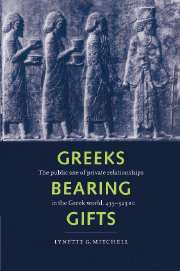Book contents
- Frontmatter
- Contents
- Preface
- Abbreviations
- 1 Philia
- 2 Philia and the polis
- 3 Philia and political activity
- 4 Magisterial appointments: Sparta
- 5 Magisterial appointments: Athens
- 6 Persia and the Greeks
- 7 Athenians and Thracians
- 8 Philip and the Greeks
- 9 Alexander
- 10 Friendship and ideology
- Appendix I Magistrates with connections
- Appendix II Notes on magistrates for the years 435–323 BC
- Bibliography
- Indexes
8 - Philip and the Greeks
Published online by Cambridge University Press: 06 July 2010
- Frontmatter
- Contents
- Preface
- Abbreviations
- 1 Philia
- 2 Philia and the polis
- 3 Philia and political activity
- 4 Magisterial appointments: Sparta
- 5 Magisterial appointments: Athens
- 6 Persia and the Greeks
- 7 Athenians and Thracians
- 8 Philip and the Greeks
- 9 Alexander
- 10 Friendship and ideology
- Appendix I Magistrates with connections
- Appendix II Notes on magistrates for the years 435–323 BC
- Bibliography
- Indexes
Summary
Philip was a man of broad vision. He drank a great deal and had eight wives. He subdued the Greeks after they had knocked themselves out in the Peloponnesian War and appointed himself Captain General so that he could uphold the ideals of Hellas. The main ideal of Hellas was to get rid of Philip, but he didn't count that one.
W. Cuppy, The Decline and Fall of Practically EverybodyOdi dolosas munerum et malas artes:
imitantur hamos dona: namque quis nescit
avidum vorata decipi scarum mused?
quotiens amico diviti nihil donat,
o Quintiane, liberalis est pauper.
Martial, Epigrams 5.18.6Philip brought himself from being a petty prince with a questionable claim to the throne of a semi-barbarian kingdom to become the most influential man in the Greek world. His growth in strength and influence was dependent not only upon his reforms (both in Macedonian institutions and in the army) and successful conquests in northern and central Greece, but also to a large degree upon his diplomatic tactics and the manner in which he dealt with the Greek states, particularly Athens. Supposedly of Argive descent, he certainly spent three years of his adolescence as a hostage in Thebes. There he may well have learned military skills from Epameinondas; he certainly learned a great deal about the way the sophisticated and educated southern Greeks thought – not only their philosophy, but also the subtleties of their codes of friendship.
- Type
- Chapter
- Information
- Greeks Bearing GiftsThe Public Use of Private Relationships in the Greek World, 435–323 BC, pp. 148 - 166Publisher: Cambridge University PressPrint publication year: 1998



